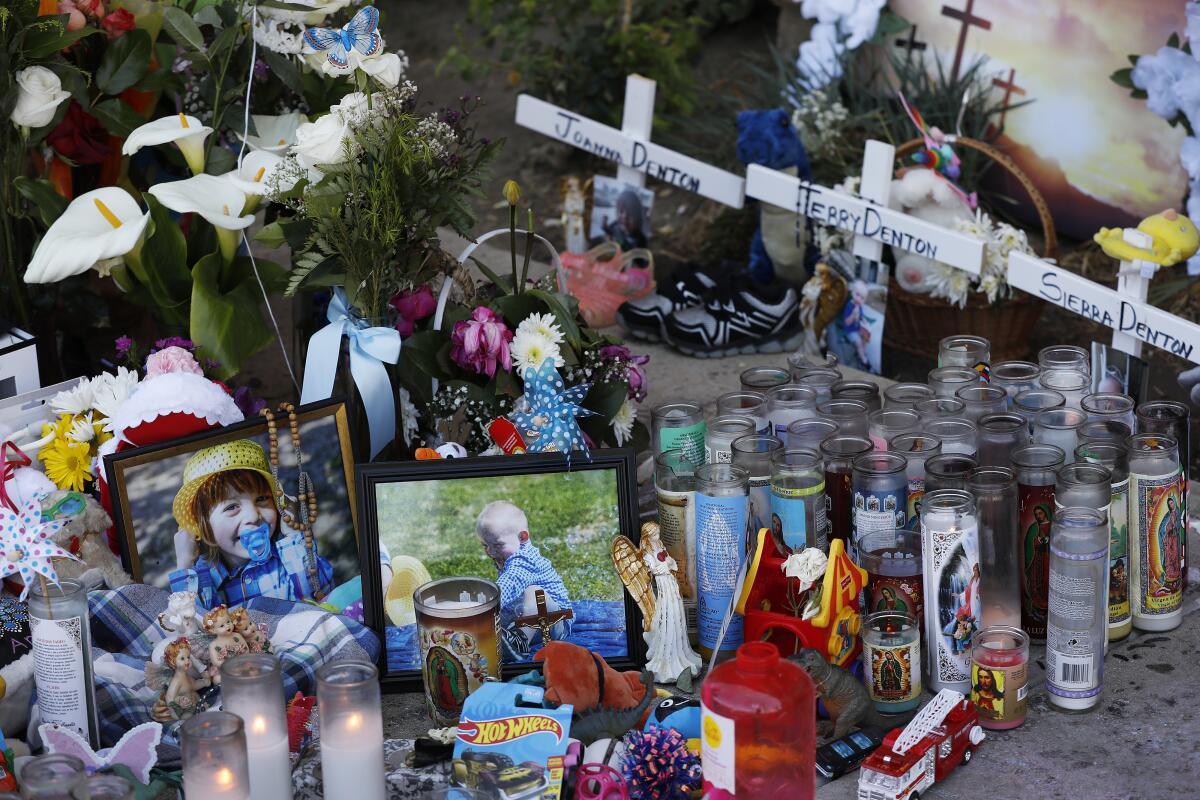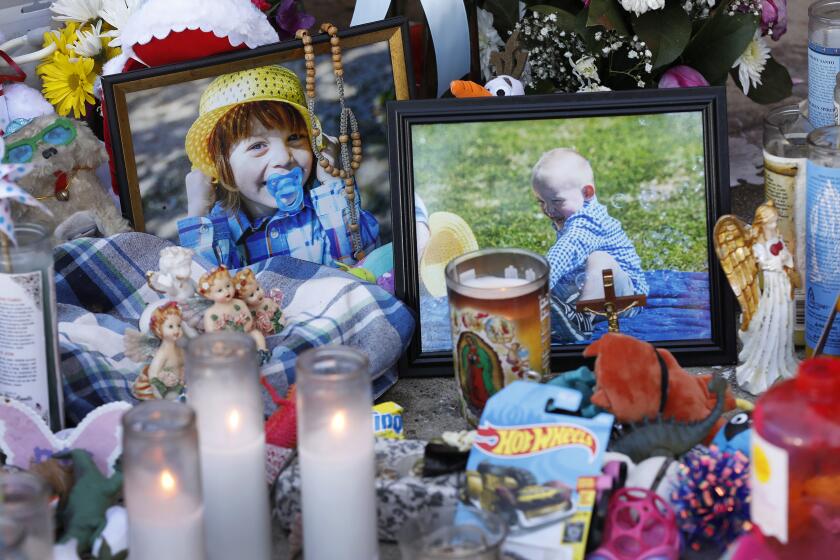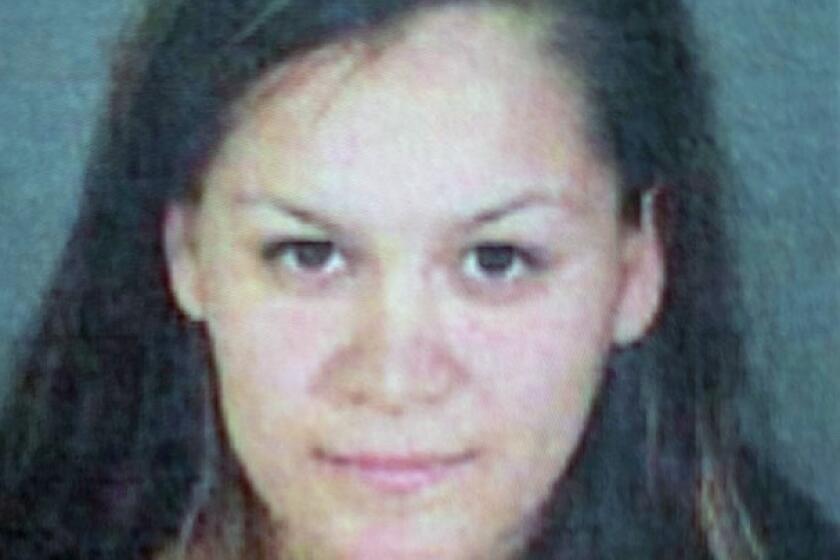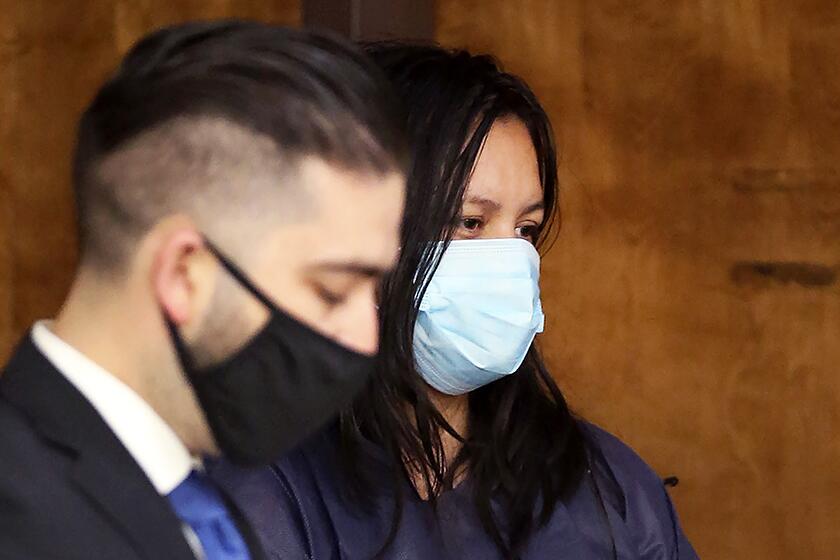Op-Ed: We desperately tried to protect three children. A broken system failed us

- Share via
On April 10 of this year, my cousin Erik called me with the worst imaginable news. His three young children — Joanna, 3, Terry, 2, and Sierra, 6 months — had been killed, he said. Their mother, Liliana Carrillo, was missing and wanted for questioning in connection with their deaths.
As horrific as the call was, it was not entirely unexpected. For nearly two months, Erik and I had been desperately worried about the children’s safety, and we had tried every way we could think of to get them removed from their mother’s custody.
She had, as has been reported in this newspaper, been acting in increasingly disturbing ways in the months after Sierra’s birth. She told Erik that she believed she was responsible for the COVID-19 pandemic and that a widespread network of child abuse existed in the town of Porterville where the family lived. She posted rambling Facebook messages, including one about how she hated being a parent.
Then, in late February, she announced she was leaving and taking the children with her to Los Angeles to get them away from Erik. At first, she’d been worried that the child abuse ring she had imagined might be using Erik to get to the children; now she believed he was a willing part of it.
Liliana Carrillo’s unraveling over the last year alarmed people in her life.
This was not only completely untrue; it was evidence of the deteriorating state of her mind. Terrified, Erik called the police, who came to their apartment. But they said they couldn’t prevent Liliana from leaving with the children, even after Erik told them of his grave concerns. Erik also reached out to a mental health crisis hotline, which sent a social worker to the home.
When my cousin turned to me for help, I was hopeful I could be of use. I am an emergency room physician, and as a doctor, I am familiar with mental health crises as well as child endangerment and abuse.
As a physician, I am required by law to report any suspected or known child abuse. I take this role seriously, and I’ve navigated the system enough to know the protocols for reporting concerns.
I also thought my education and experience might give me credibility with the social workers, police officers and others we interacted with within the system. I believed that they would at least listen to me and respect my medical and professional opinion.
There were numerous reports about the welfare of three Reseda toddlers before they were killed Saturday, allegedly by their mother.
That’s not what happened. In the days and weeks after Liliana took the children, we made numerous calls for help — to child protection agencies in two counties, to specific social workers, to hotlines, to law enforcement, to the courts. But we kept getting stonewalled. We poured out our concerns about the kids and were referred elsewhere, or told we’d receive a call back, or told it would take time. Even small victories we thought we’d achieved quickly evaporated.
In early March, shortly after Liliana left, Erik was able to get the court in Tulare County to issue an emergency custody order, which we hoped would allow him to take back the children.
We went to the home in Los Angeles where Liliana was staying and called the Los Angeles Police Department for assistance in removing the kids. Two officers came out, and we explained the situation to them, and again to their supervising officer who was called to the scene when it became clear we were going to keep pushing. But they left without helping, saying it wasn’t their responsibility.
They referred us to the social worker we had been trying to reach, but who had yet to call us back. They said we might try the L.A. County Sheriff’s Department or go back to the court for another type of custody order. Despite our pleas for help, the burden of physically finding and securing the safety of the three children remained on our shoulders.
In the end, every part of the system failed spectacularly, and three children paid for that failure with their lives. Their mother, meanwhile, is sitting in jail charged with murder. Their father is shattered. And the most horrifying thing of all is that the deaths were preventable if the system had worked as it was supposed to.
Nothing can change what happened. But I want to help ensure that something like this can never happen again. I will never stop advocating to fix the system. When a credible report of child endangerment is made, particularly when there are corroborating reports as there were in this case, action needs to be taken immediately and shouldn’t stop until children are removed from dangerous situations or found to be safe.
After the children died, Erik wanted — needed — to see them. But the viewing was delayed for more than a week as the investigation proceeded and autopsies were conducted. Finally, the children were taken to a funeral home and prepared for us to see them.
Mother admits drowning three children in Reseda apartment
The three children, so tiny they all fit on a single table, were tightly swaddled in soft blankets picked by their grandmother. There was Sierra lying between her older siblings, so young she never even walked or talked; Terry, with whom I share a namesake — my grandfather — and who, at 2, was the age I was when I decided I wanted to be a doctor; and Joanna, the 3-year-old big sister. They were so still. I sobbed openly while Erik stood silently at the foot of the table.
Erik was hesitant and overwhelmed, so in the end I picked up the smallest child and placed her in her father’s arms. He asked to be alone with his children, and as I hovered outside the door, he picked up and cradled each child in turn as he cried.
I was glad I could be there for my cousin, but a part of me kept thinking that handing this grieving father his lifeless baby really should have been the job of the social workers who couldn’t be bothered to call us back, the police officers who walked away rather than intervene, or any of the other officials in a system that failed so utterly despite the strong evidence that Liliana’s mental state posed a danger to the children.
I think about those people often. Are they as broken as I am? Are they as angry? Do they feel guilt for their inaction? I hope so. And I hope they take their pain and turn it into action to fix this broken system.
Teri Miller is a UCLA-trained emergency medicine physician.
More to Read
A cure for the common opinion
Get thought-provoking perspectives with our weekly newsletter.
You may occasionally receive promotional content from the Los Angeles Times.













